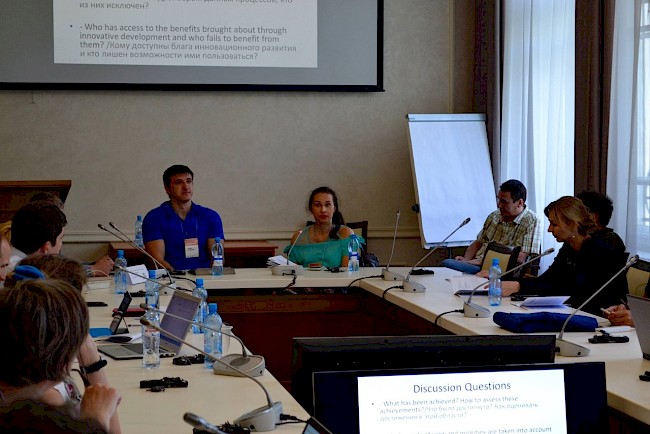Making health public in Russia
—
The third ‘Social Sciences & Health Innovations: Making Health Public’ conference was held 22–24 May 2017 in Tomsk, Russia. In accordance with the program[note 1] of the conference, organizers aimed to explore ‘what exactly does “public” stand for in public health?’ and ‘to serve as a platform to facilitate dialogue between social and biomedical scientists, public health professionals and policy makers, and for engagement between scholars and practitioners working in the field of health innovations in the post-Soviet region and globally’. Besides keynote lectures from guest speakers and participants on diverse panels covering public health issues, mostly from a science and technology studies (STS) viewpoint, two sections specifically focused on public engagement: a roundtable entitled ‘Innovative Development of the Russian Medical Industry: Time to Take Stock’ and a panel entitled ‘Engaging Technology in Public Health: Promises and Ambivalences’.
Engagement of scholars in public matters has become a ‘hot’ theme for social sciences: the 2017 Society for Social Studies of Science (4S) conference had a plenary session titled ‘Opportunities and challenges for an engaged STS’,[note 2] while the 2017 AAA conference theme declared ‘Anthropology Matters!’ and called ‘across the field to unite in our diversity, to embrace difficulty, be vibrant messmates, and promote the relevance of what anthropology is and does for the society’.[note 3] The conference in Tomsk followed this trend while offering some specific insights into Russian public health and innovations.
In Russia, the public health economic sector has been undergoing dramatic changes since the early 2000s.[note 4] These changes include a so-called optimization, which in fact means a decrease in the number of hospitals almost by half[note 5] and cuts to health care budgets for the last three years.[note 6] At the state level there is the idea that innovations are important to counterbalance the shortage in state funding of the health care sector, and that these innovations can bring the economy to the next level. Evgenia Popova (National Research Tomsk State University) discussed the process of transition from mostly state-regulated public health to pseudo-commercial or mixed forms and concluded that it did not go smoothly. Elena Sokolova (Institute for Ethnography and Anthropology of the Russian Academy of Sciences, Moscow) pointed out that the current transition processes in health care have resulted in polarization of the society into two groups: those who support a technological focus of state initiatives and those who do not accept it. The ambivalence of the situation was discussed at panel sessions ‘Engaging Technology in Public Health: Promises and Ambivalences’ and ‘The Diverse Knowledges in Public Health: Controversies and Contestations’. Questions that arose included: What can academics add to theoretical discussions and analytical reflections on public health issues? How can they contribute to changing public health for the better? Can academics use technologies, both IT and social, to do that? Which forms of engagement can be introduced in these particular circumstances?
The conference program included examples of collaborations between social workers and academics with positive results. Academics have used their knowledge and technologies to create new career possibilities for people with mild intellectual disabilities, as was shown in the paper by Barbara Regeer (Vrije Universiteit, Amsterdam). Hernâni Zão Oliveira and Helena Lima (University of Porto) presented a case about academic researchers who led a project involving the creation of an app for children with cancer. Martine Bouman (Centre for Media & Health and Erasmus University, Rotterdam) dedicated her keynote speech to creating a crossover between public health and the creative media industry.
With regard to social engagement in public health, the most promising part of the conference was a roundtable on innovative development of the Russian medical industry. It was a gathering of Russian regional researchers (National Research Tomsk State University, Siberian State Medical University, among others), businessmen (NIKOR, IPHAR, and others) and representatives of nongovernmental organizations (Russian Society for Disabilities). Having an initial objective to discuss the efficiency of state programs on medical innovations, this talk was an important overview of current local insights. It revealed a need for a place where local stakeholders can interact, as well as the lack of an activist culture at the regional level. Following this talk, organizers of the conference began considering setting up a regional pilot project in order to facilitate public engagement and inclusive development of state programs in public health.
This pilot project might be considered a good example of social care. Donna Haraway (2008, 36) describes caring as ‘becoming subject to the unsettling obligation of curiosity, which requires knowing more at the end of the day than at the beginning’. This role seems to suit scientists quite well. However, I would like to raise a question: is this academic mediation of care enough to ensure more active forms of public engagement? Nassim Taleb (2017) claims that ‘skin in the game’, that is, both accountability and the ability to take risks, is a criterion of true social activism. Of all stakeholders, I’d like to ask: who can act beyond curiosity?
This year the conference ‘Social Sciences & Health Innovations: Multiplicities’ will be held in Tomsk, Russia on 23–25 May 2019. For more information, see: http://en.past-centre.ru/conferences-seminars/sts-conference/social-sciences-health-innovations-multiplicities-2019/.
About the author
Elena Sokolova is a PhD candidate in anthropology in the Institute of Ethnology and Anthropology, Russian Academy of Sciences, with major interests in body and technology.
Email: elena.k.sokolova@gmail.com
References
Haraway, Donna. 2008. When Species Meet. Minneapolis: University of Minnesota Press.
Taleb, Nassim Nicholas. 2017. ‘The Merchandising of Virtue’. Incerto [blog], 27 May. https://medium.com/incerto/the-merchandising-of-virtue-b548762658f0.
